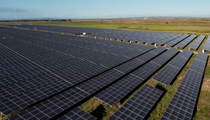Eurozone inflation rate rises to 2.3%: Should the ECB be worried?

Eurozone inflation rose to 2.3% year-on-year in November, up from 2% in October, according to preliminary data published by Eurostat on Friday. The figure is in line with market expectations and reflects the expected narrowing of the deflationary impact of energy prices.
While annual growth marks a slight departure from the European Central Bank (ECB) target, monthly data show a more optimistic trend. Eurozone consumer prices fell 0.3% in November compared to October, the biggest monthly drop since January 2024.
This decline supports hopes that disinflation is continuing, potentially paving the way for further rate cuts by the ECB. Energy prices, a key factor in inflation dynamics, remained 1.9% lower year-on-year in November. However, this decline was less pronounced than the 4.6% and 6.1% declines seen in October and September respectively, as the base effect from last year's energy price rise fades.
On a monthly basis, energy prices increased by 0.6%. Excluding energy, the annual rate of inflation held steady at 2.7%, while the measure of core inflation, which excludes energy and food prices, rose to 2.8% year-on-year, compared with 2.7% in October.
Core monthly inflation fell 0.4%, suggesting that underlying price pressures may be easing. Service prices, an inflationary "sticky" component, rose 3.9% year-on-year but fell 0.9% from October, offering a glimmer of hope for the inflation outlook.
November's inflation data is unlikely to change the ECB's current policy trajectory. The decline in monthly core inflation and utility prices supports the argument that disinflationary forces remain intact. This trend gives the ECB further justification for cutting interest rates at its December meeting, especially as economic activity weakens across the eurozone.
The latest Purchasing Managers' Index (PMI) surveys show that eurozone private sector activity contracted in November, highlighting the worsening economic momentum. The Eurozone Composite PMI fell to 48.1 in November, from a neutral 50.0 recorded in October, signaling the strongest contraction since January and missing market expectations for an unchanged reading.
Furthermore, while the manufacturing sector remains mired in a deep downturn, the services sector is no longer supporting the economy. For the first time in 10 months, the services sector contracted, with its PMI falling to 49.2 from 51.6 in October.
Financial markets showed little reaction to inflation and retail sales data. The euro was steady at $1.0560 against the US dollar, while eurozone sovereign bond yields were unchanged. Germany's 10-year Bund yield stood at around 2.12%, its lowest level in nearly two months.
Equity markets also traded flat, with the Euro STOXX 50 index unchanged after rising 0.4% on Thursday. Among the top blue-chip stocks, Airbus SE gained 1.3%, Schneider Electric SE rose 1%, and LVMH advanced 0.6%. On the downside, Telefonica and Banco Santander fell by 1.5% and 1.2% respectively.

Germany plans to invest 2 billion euros in its semiconductor sector!
Germany has revealed that it plans to invest around 2 billion euros in the country's semiconductor sector in the form of subsidies, according to Bloomberg.......

Turkey falls into recession - Interest rates continue to remain very high
Turkey's economy shrank by 0.2% quarter-on-quarter in the July-September period, the Turkish Statistics Institute said on Friday. This follows a decline at......

The British "give away" their homes to family members - The number of homes changing ownership to avoid taxes is increasing
An increasing number of UK homes will be passed for free this year as homeowners seek to escape rising taxes by passing assets on to family members. More......

"Green hydrogen market depends on public spending" - German energy company stresses need for government support
The development of a green hydrogen market in Germany still depends to a large extent on public spending, energy supplier E.ON said. Projects under......

"China's Coal Consumption to Peak in 2025" - Experts Express Optimism for Green Transition in Coming Years
China's coal consumption could peak by 2025, experts warn. New research from the climate institute, the Center for Clean Energy and Air Research (CREA) and......

245.16 MW of solar energy are licensed - Energy production from photovoltaic plants, 12 new licenses during 2024
The year 2024 has marked developments in terms of the licenses granted for the production of energy from the sun and the capacity that is expected to be......

8.4 million euros for the access road to Shkodër - ARRSH announces the winner for the Bërdica curve-Ura e Bahçallek axis
The construction of the new road for the entrance to the city of Shkodra will cost about 8.4 million euros. The Albanian Road Authority has announced the......

Head of ECB, message to Trump - Lagarde calls for negotiations with the US to avoid trade tariffs
European Central Bank President Christine Lagarde said the European Union may be in a better position to talk to the United States about possible trade......


















